语法 非谓语
图片预览

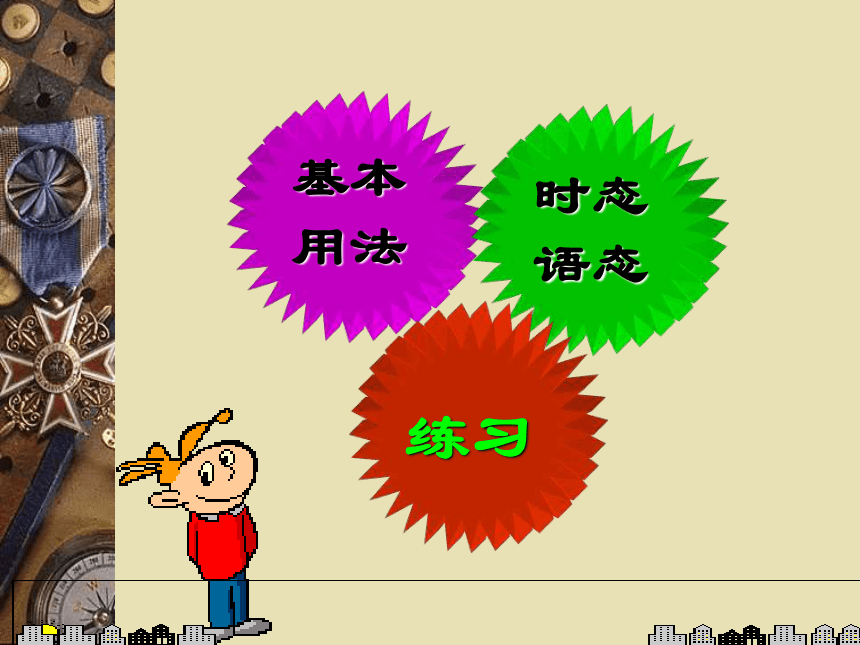
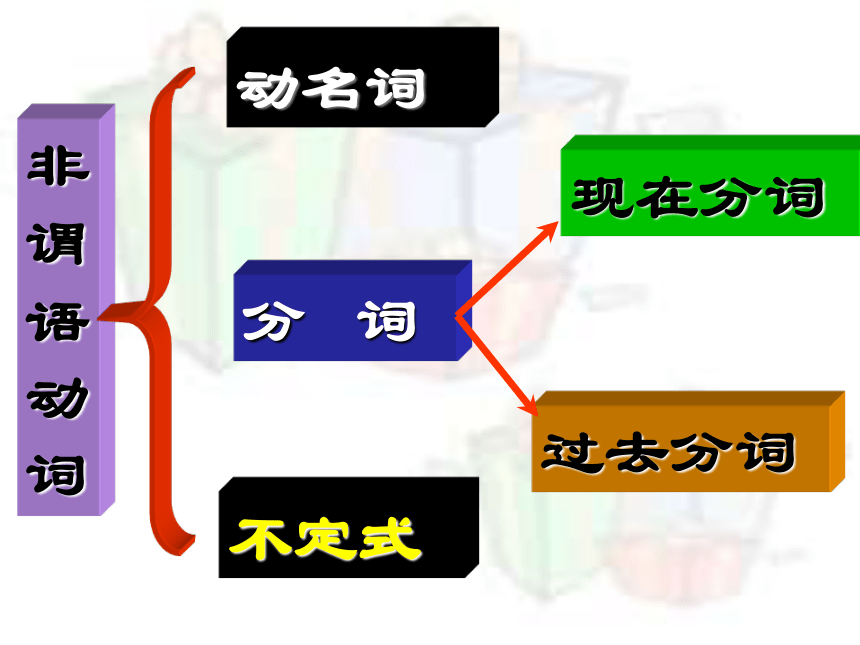
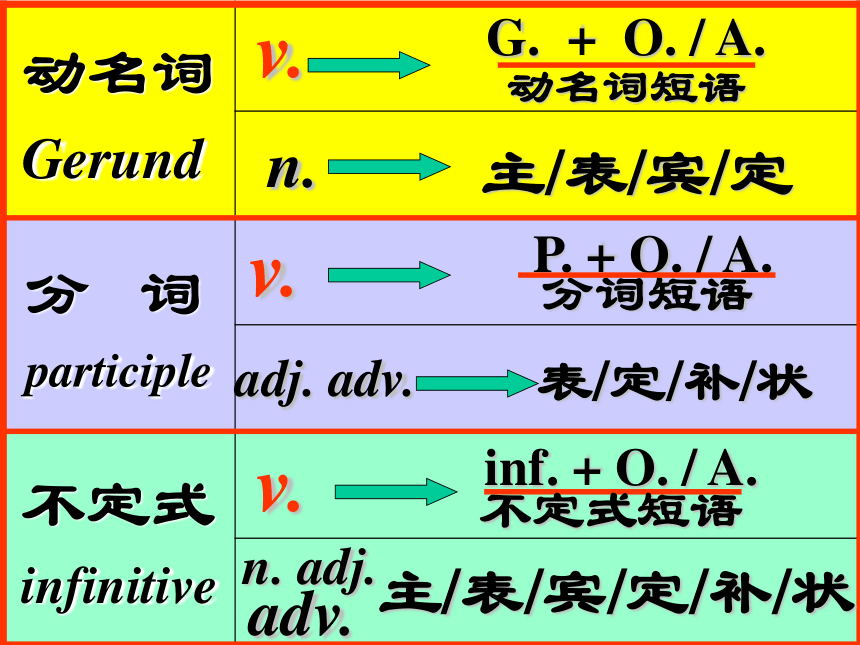
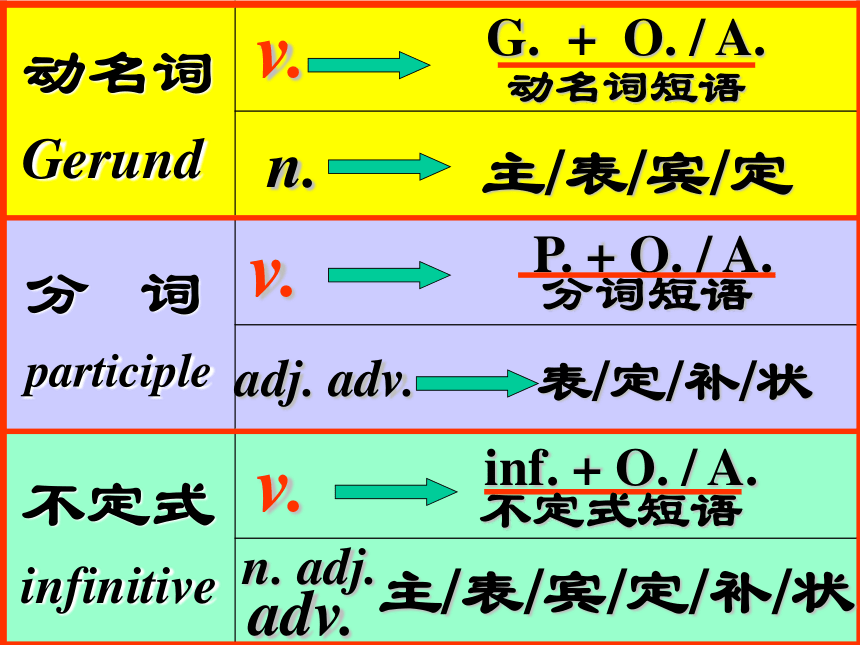

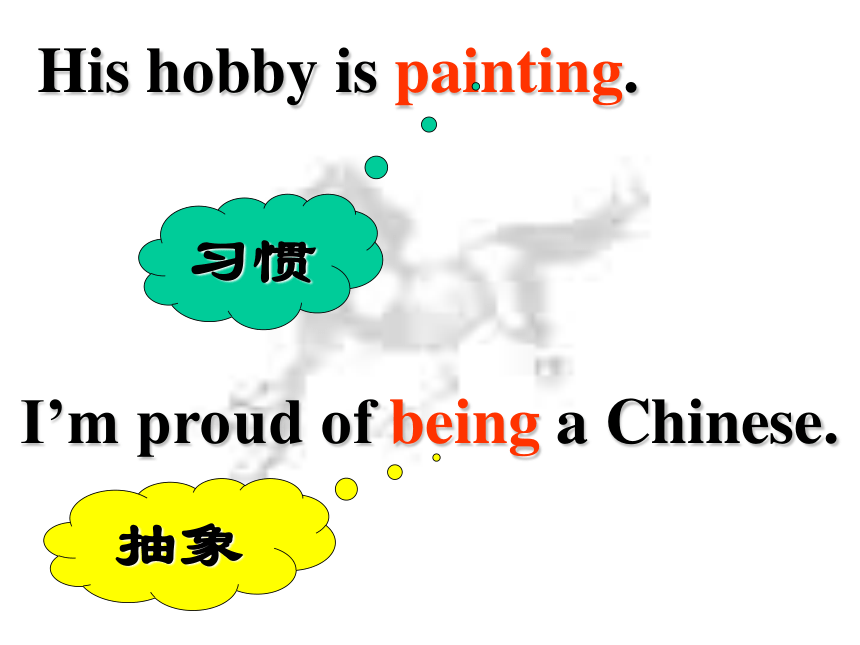
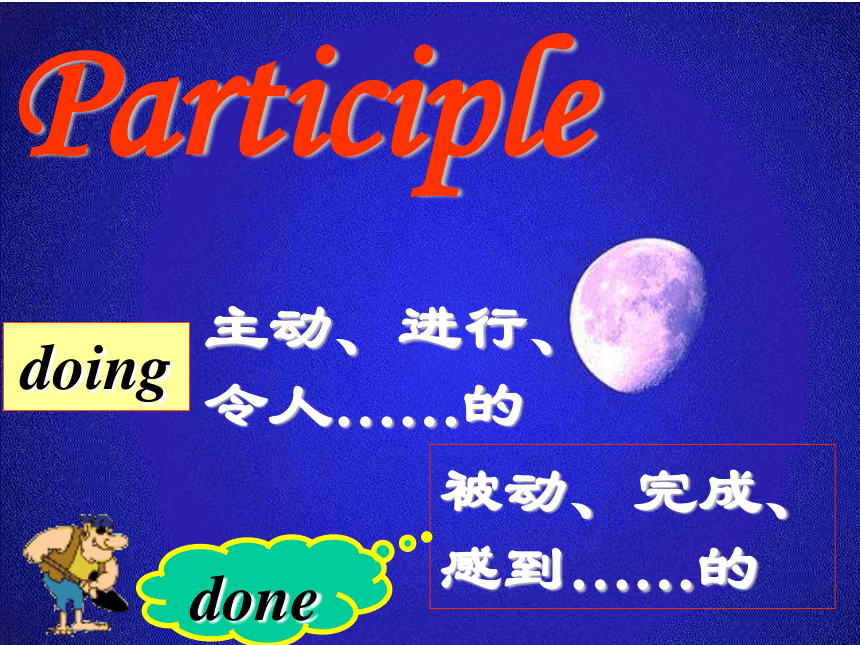
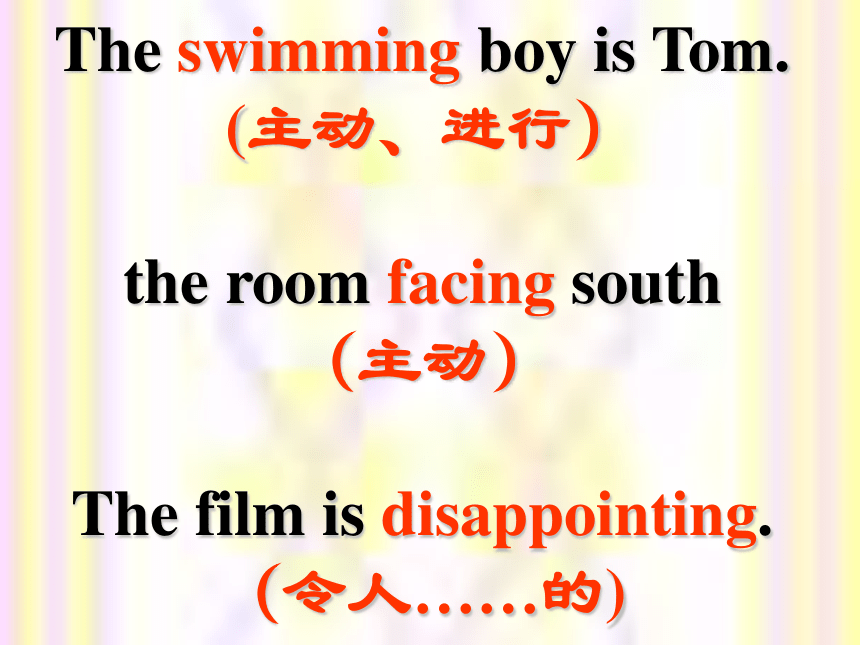
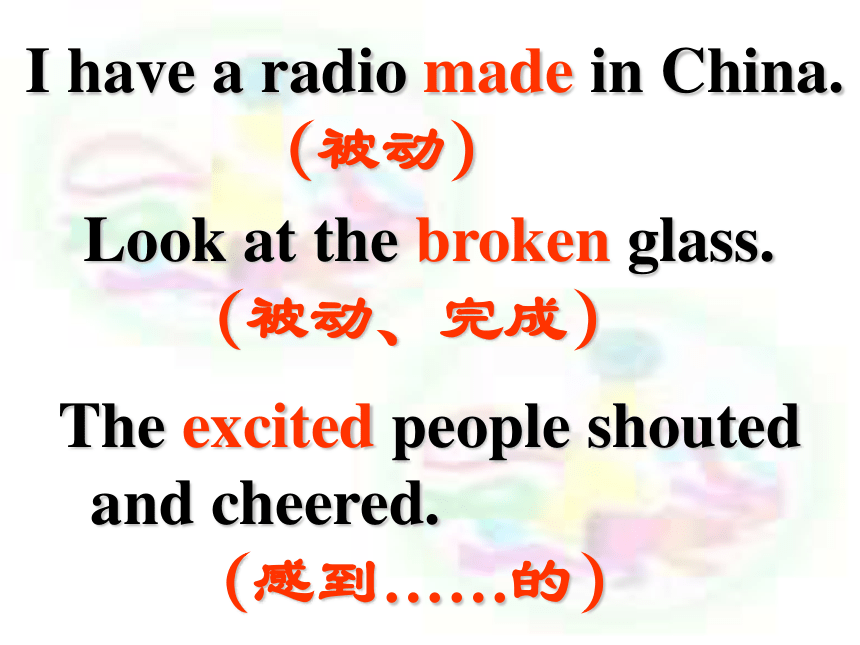


文档简介
课件115张PPT。非谓语动词The Non-predicative Verbs时态
语态基本
用法练习非
谓
语
动
词动名词分 词不定式现在分词过去分词v. v. v. G. + O. / A.动名词短语n.主/表/宾/定adj. adv.P. + O. / A.inf. + O. / A. 分词短语不定式短语表/定/补/状主/表/宾/定/补/状v. v. v. G. + O. / A.动名词短语n.主/表/宾/定adj. adv.P. + O. / A.inf. + O. / A. 分词短语不定式短语表/定/补/状主/表/宾/定/补/状The Gerund动名词的特点:① 抽象
② 习惯性His hobby is painting.I’m proud of being a Chinese.习惯抽象Participle被动、完成、
感到……的主动、进行、
令人……的donedoingThe swimming boy is Tom.
(主动、进行)
the room facing south
(主动)
The film is disappointing.
(令人……的)I have a radio made in China.
(被动)Look at the broken glass.
(被动、完成)The excited people shouted
and cheered.
(感到……的)infinitive表将来表目的表某一次具体的动作I have a lot of work to do.
(将来)To learn English well, you
must practise more.
(目的)I like dancing, but I don’t
like to dance today.
(某一次具体的动作)主 语1.若句子的主语和表语都为非
谓语动词,其形式要求一致。2.It is (no) good/use doing sth.Teaching is learning.It is no use doing that.那样做是没用的。教也是学。表 语动名词分词不定式His job is teaching Chinese.The news is exciting.All of us are disappointed.What you should do is
to look after the baby.定 语 主动
进行
令人…的被动
完成
感到…的drinking water
reading room=the water for drinking=the room for reading作定语the sleeping babyfallen leavesthe broken cuprunning waterexciting newsthe disappointing boythe disappointed boythe work to dothe boy standing thereThe window broken by Tomthe clothes to wash tomorrowHe has a lot of work to do.He is the right person to do it.It’s the best way to learn English.主谓动宾说明内容不定式作定语的基本条件不定式与它所修饰的名词在逻
辑上必须具备以下条件之一:1. 主谓关系
2. 动(介)宾关系
3. 说明所修饰词的内容多为抽象名词或序数词I have no chair to sit on.I have a lot of clothes
to wash.
to be washed.Pay attention to the followingthe food to live ______
the bus to come here ____
the pen to write _____
the room to live ____
the knife to cut _____
the person to write ____ononwithinwithabout宾 补分词不定式donedoing主动进行被动完成取决于
谓语动词see
watch
look at
hear
listen to
feel
notice+sb. +do
doing
donemake let
havesb. beseen
watched
looked at
heard
listened to
felt
noticed+to do made
letadvise allow ask
beg cause expect
encourage force
get hate invite
order oblige wish
want warn remind
promise permit
persuade request…sb. to domake oneself doneI can’t make myself under-
stood because of my broken
English.
A liar can’t make himself
believed.find + O. + doing / doneHe found a wallet lying on
the ground.
I found the city changed a lot.宾语作宾语只能用动名词作宾语的动词和词组:advise,admit,avoid,consider,
delay,enjoy,excuse,finish,
deny,allow,escape, forgive,
imagine,mind,keep,miss,
practise,prevent,resist,risk,suggest, understand,
appreciate,can’t help
put off, give up动名词常可用于下列词组后feel like, devote…to,
be busy, There is no need
use
harm
hurry(in)
doingThere is
/ are/
I/we have difficulty
trouble
problem
fun
pleasure
a good time
a hard time(in)
doing只能接不定式作宾语的动词hope, wish, promise, refuse,
arrange, decide, fail, manage,
offer, prepare, pretend, hate,
prefer, ask, choose, expect … begin
start
continue +to do
doing注意下列动词①②like
love
hate
prefer
learn+to do
doing③remember
forget
regret+to do
doing④try
mean
stop
go on+to do
doing注意下列结构be used to do
be / get used to doing
used to do状语doing
与主语为主动关系done
与主语为被动关系作目的状语作其他状语Hearing the bad news,
they couldn’t help crying.When they
heard the
bad newsGiven more attention,
the trees could have grown
better.If they had
been given more
attentionBeing so angry,
he couldn’t go to sleep.Because he was so angryThey came into the classroom,
singing and laughing.To serve the people well,
I study hard.判断下列句子正误:1. To learn English well, a lot
of practice must be done.
2. Seeing from the hill, the city
is more beautiful.
3. Heating , water will boil.
4. Getting there, the door was
found opened. 判断句子正误并改正:1, Being ill, his classmate sent
him to hospital.
2. To get there in time, he told
me to get up early.
3, Broken by Jim, I can’t use
the cup.将下列状语从句改为非谓语
短语作状语:
1. Because she was moved by
the hero, she decided to
study harder.2. When he found the door
locked, he went home.He started early in order that
he could get there on time.将下列非谓语短语改写为状语从句1. Not knowing her address,
I can’t write to her.
2. Entering the room,
I saw a strange sight.
3, Scolded by the teacher,
he was very sad.4.Not knowing where to go,
he asked a policeman . 5. Hearing her friend was bad-
ly hurt, she burst into tears. 6. Knowing his team had
won, he became happy at once.for / of sb. to do my / Tom's doing It is
important to learn English.It is important
for us to learn English.It is / was +
adj. +for / of sb. to doIt’s kind you to say so.It’s strange you to do that.offorStudying English is important.Our studying EnglishLi Lei’s Studying English用两个复合结构翻译句子:1. 李明的迟到使得老师很生气。2.我现在离开你介意吗?3.他对我打电话会很吃惊的。4.你在这河里游泳是很危险的。Answer1. Li Ming’s being late made
his teacher very angry.
2. Do you mind my leaving
now?
3. He will be surprised at
my calling.
4.It’s dangerous for you to
swim in the river.非谓语动词
的
时态和语态英语基本时态构成一览表dobeshall / willhavehave 语态时态动名词的时态和语态Thank you for having helped
me so much.
He is praised for having
devoted his life for his country.
Before being used, the machine
must be checked.He insisted on being sent to
hospital.
He insisted on sending her to
hospital.对比下列句子注意下面句式 n.
S. + be worth
doingS. + be worthyof + n.
to be done
of being done语态时态不定式的时态和语态He pretended to be working
hard when his boss passed him. He seems to be eating
somethingI’m sorry
to have kept you waiting.Pay special attention to:hoped
promised
wanted
wished
expected
plannedto have done表示过去没有实现的期待和愿望He wanted to have met you at
the airport, but he didn’t get
there in time. We planned to have done good
deeds for the poor people last
monthshould
ought to
need
may
might
could
would(not) have done(过去)本来……
结果与事实相反You should have finished
your homework.
We needn’t have worried
about him.
You shouldn’t have been there.must
can’t
can
may
might
could+ be n. / adj. / …
be doing
have doneNobody opened the door.
She might (may) have left.
The road is all wet. It must
have rained last night.
I saw him just now. He can’t
have gone to Shanghai.语态时态现在分词的时态和语态现在分词的时态和语态:Having been to the Great Wall
many times, He didn’t go
there yesterday. Not having received his
father’s letter, he decided to
make a call to him.因为没收到他父亲的来信,
他决定给他打个电话。The building being built is
our new library.Not having been finished,
the book can’t be returned
at present.1.____is a good of exercise for
both the young and the old.
A. The walk B. Walking
C. To walk D. Walk2.When and where to build
the new power station____ yet.
A. is not decided
B. are not decided
C. has not decided
D. have not decided3.Is______necessary to change
trains at Beijing?
A. this B. that
C. it D. he4.Our father often told us in
the past that _____is believing.
A. To see
B. Seeing
C. See
D. To be seen5.She pretended ________the
letter I wrote the day before
yesterday.
A. not to receive
B. not receiving
C. not to hear from
D. having not received6.I can’t imagine _____ that
with such a famous author.
A. work
B. to work
C. to be working
D. working7.She reached the top of the
hill and stopped _____ on a
rock by the side of the path.
A. to have rested
B. resting
C. to rest
D. rest8.People couldn’t help _____
the funny villager.
A. laugh at
B. to laught at
C. laughing at
D. laughing on9.I can’t help _____the house
because I’m busy making
a cake.
A. to clean
B. cleaning
C. cleaned
D. being cleaned10.Do you consider _____ any
good attempting many
scientific experiments?
A. there
B. it
C. this
D. that11.I’m thirsty. Would you
please give me something
________.
A. drunk
B. to drink
C. to be drunk
D. for drinking12.When I handed the report
to John, he said that George
was the person______.
A. to send
B. for sending it
C. to send it to
D. for sending it to 13.There was a terrible noise
_______the sudden burst
of light.
A. followed
B. following
C. to be followed
D. being followed14.The first textbooks _____
for teaching English as a
foreign language came out in
the 16th century.
A. having written
B. to be written
C. being written
D.written15.Mrs.Smith warned her
husband _____ after drinking
again and again.
A. never to drive
B. to never drive
C. never driving
D. never drive16.They knew her very well.
They had seen her____up
from childhood.
A. grow
B. grew
C. was growing
D. to grow17. Believe it or not, he was
seen ______upstairs just now.
A. to go
B. to going
C. having gone
D. go18.It was so cold that they
kept the fire _______all night.
A. to burn
B. burn
C. burning
D. burned19.The salesman scolded the
girl caught __ and let her off.
A. to have stolen
B. to be stealing
C. to steal
D. stealing20.He was disappointed to
find his suggestion_______.
A. turning down
B. turned down
C. to be turned down
D. to turn down21.The murderer was brought
in ,with his hands ______
behind his back.
A. being tied
B. having tied
C. to be tied
D. tied22.Tom kept quiet about the
accident _______lose his job.
A. not in order to
B. so as not to
C. in order to not
D. not so as to 23.They have had a long and
bitter struggle _____ their
living conditions.
A. to improving
B. for improving
C. to improve
D. improve24.To master a foreign
language,______.
A. a lot of practice is needed
B. it needs a lot of practice
C. practice is in need of
D. one needs a lot of practice25.The secretary worked late
into the night, ______ a long
speech for the president.
A. to prepare
B. preparing
C. prepared
D. was preparing26.________more attention,
the work would have been
done better.
A. Given
B. To give
C. Giving
D. Having given27._________a reply, he
decided to write a sixth letter.
A. Not receiving
B. Not to receive
C. Not having received
D. Having not received28.Charles Babbage is
generally considered______
the first computer.
A. to invent
B. inventing
C. to have invented
D. having invented29.The squirrel was lucky that
it just missed___________.
A. catching
B. to be caught
C. being caught
D. to catch30.Little Jim should love _____
to the theatre this evening.
A. to be taken
B. to take
C. being taken
D. taking31.—What do you think of the
book?
—Oh ,excellent. It’s worth
______a second time.
A. to read
B. to be read
C. reading
D. being read32.The library needs ______,
but it’ll have to wait
until Sunday.
A. cleaning
B. be cleaned
C. clean
D. being cleanedMore Exerciseslie lied lied lying撒谎
lie vi lay lain lying
躺下; 位于
lay vt laid laid laying
放置;下蛋、产卵The book is lying on the desk.The book is laid on the desk.the booklying on the desklaid on the deskwith +n./ pron. +adj.
adv.
p.
inf.
prep. ph.with + 复合宾语结构:
语态基本
用法练习非
谓
语
动
词动名词分 词不定式现在分词过去分词v. v. v. G. + O. / A.动名词短语n.主/表/宾/定adj. adv.P. + O. / A.inf. + O. / A. 分词短语不定式短语表/定/补/状主/表/宾/定/补/状v. v. v. G. + O. / A.动名词短语n.主/表/宾/定adj. adv.P. + O. / A.inf. + O. / A. 分词短语不定式短语表/定/补/状主/表/宾/定/补/状The Gerund动名词的特点:① 抽象
② 习惯性His hobby is painting.I’m proud of being a Chinese.习惯抽象Participle被动、完成、
感到……的主动、进行、
令人……的donedoingThe swimming boy is Tom.
(主动、进行)
the room facing south
(主动)
The film is disappointing.
(令人……的)I have a radio made in China.
(被动)Look at the broken glass.
(被动、完成)The excited people shouted
and cheered.
(感到……的)infinitive表将来表目的表某一次具体的动作I have a lot of work to do.
(将来)To learn English well, you
must practise more.
(目的)I like dancing, but I don’t
like to dance today.
(某一次具体的动作)主 语1.若句子的主语和表语都为非
谓语动词,其形式要求一致。2.It is (no) good/use doing sth.Teaching is learning.It is no use doing that.那样做是没用的。教也是学。表 语动名词分词不定式His job is teaching Chinese.The news is exciting.All of us are disappointed.What you should do is
to look after the baby.定 语 主动
进行
令人…的被动
完成
感到…的drinking water
reading room=the water for drinking=the room for reading作定语the sleeping babyfallen leavesthe broken cuprunning waterexciting newsthe disappointing boythe disappointed boythe work to dothe boy standing thereThe window broken by Tomthe clothes to wash tomorrowHe has a lot of work to do.He is the right person to do it.It’s the best way to learn English.主谓动宾说明内容不定式作定语的基本条件不定式与它所修饰的名词在逻
辑上必须具备以下条件之一:1. 主谓关系
2. 动(介)宾关系
3. 说明所修饰词的内容多为抽象名词或序数词I have no chair to sit on.I have a lot of clothes
to wash.
to be washed.Pay attention to the followingthe food to live ______
the bus to come here ____
the pen to write _____
the room to live ____
the knife to cut _____
the person to write ____ononwithinwithabout宾 补分词不定式donedoing主动进行被动完成取决于
谓语动词see
watch
look at
hear
listen to
feel
notice+sb. +do
doing
donemake let
havesb. beseen
watched
looked at
heard
listened to
felt
noticed+to do made
letadvise allow ask
beg cause expect
encourage force
get hate invite
order oblige wish
want warn remind
promise permit
persuade request…sb. to domake oneself doneI can’t make myself under-
stood because of my broken
English.
A liar can’t make himself
believed.find + O. + doing / doneHe found a wallet lying on
the ground.
I found the city changed a lot.宾语作宾语只能用动名词作宾语的动词和词组:advise,admit,avoid,consider,
delay,enjoy,excuse,finish,
deny,allow,escape, forgive,
imagine,mind,keep,miss,
practise,prevent,resist,risk,suggest, understand,
appreciate,can’t help
put off, give up动名词常可用于下列词组后feel like, devote…to,
be busy, There is no need
use
harm
hurry(in)
doingThere is
/ are/
I/we have difficulty
trouble
problem
fun
pleasure
a good time
a hard time(in)
doing只能接不定式作宾语的动词hope, wish, promise, refuse,
arrange, decide, fail, manage,
offer, prepare, pretend, hate,
prefer, ask, choose, expect … begin
start
continue +to do
doing注意下列动词①②like
love
hate
prefer
learn+to do
doing③remember
forget
regret+to do
doing④try
mean
stop
go on+to do
doing注意下列结构be used to do
be / get used to doing
used to do状语doing
与主语为主动关系done
与主语为被动关系作目的状语作其他状语Hearing the bad news,
they couldn’t help crying.When they
heard the
bad newsGiven more attention,
the trees could have grown
better.If they had
been given more
attentionBeing so angry,
he couldn’t go to sleep.Because he was so angryThey came into the classroom,
singing and laughing.To serve the people well,
I study hard.判断下列句子正误:1. To learn English well, a lot
of practice must be done.
2. Seeing from the hill, the city
is more beautiful.
3. Heating , water will boil.
4. Getting there, the door was
found opened. 判断句子正误并改正:1, Being ill, his classmate sent
him to hospital.
2. To get there in time, he told
me to get up early.
3, Broken by Jim, I can’t use
the cup.将下列状语从句改为非谓语
短语作状语:
1. Because she was moved by
the hero, she decided to
study harder.2. When he found the door
locked, he went home.He started early in order that
he could get there on time.将下列非谓语短语改写为状语从句1. Not knowing her address,
I can’t write to her.
2. Entering the room,
I saw a strange sight.
3, Scolded by the teacher,
he was very sad.4.Not knowing where to go,
he asked a policeman . 5. Hearing her friend was bad-
ly hurt, she burst into tears. 6. Knowing his team had
won, he became happy at once.for / of sb. to do my / Tom's doing It is
important to learn English.It is important
for us to learn English.It is / was +
adj. +for / of sb. to doIt’s kind you to say so.It’s strange you to do that.offorStudying English is important.Our studying EnglishLi Lei’s Studying English用两个复合结构翻译句子:1. 李明的迟到使得老师很生气。2.我现在离开你介意吗?3.他对我打电话会很吃惊的。4.你在这河里游泳是很危险的。Answer1. Li Ming’s being late made
his teacher very angry.
2. Do you mind my leaving
now?
3. He will be surprised at
my calling.
4.It’s dangerous for you to
swim in the river.非谓语动词
的
时态和语态英语基本时态构成一览表dobeshall / willhavehave 语态时态动名词的时态和语态Thank you for having helped
me so much.
He is praised for having
devoted his life for his country.
Before being used, the machine
must be checked.He insisted on being sent to
hospital.
He insisted on sending her to
hospital.对比下列句子注意下面句式 n.
S. + be worth
doingS. + be worthyof + n.
to be done
of being done语态时态不定式的时态和语态He pretended to be working
hard when his boss passed him. He seems to be eating
somethingI’m sorry
to have kept you waiting.Pay special attention to:hoped
promised
wanted
wished
expected
plannedto have done表示过去没有实现的期待和愿望He wanted to have met you at
the airport, but he didn’t get
there in time. We planned to have done good
deeds for the poor people last
monthshould
ought to
need
may
might
could
would(not) have done(过去)本来……
结果与事实相反You should have finished
your homework.
We needn’t have worried
about him.
You shouldn’t have been there.must
can’t
can
may
might
could+ be n. / adj. / …
be doing
have doneNobody opened the door.
She might (may) have left.
The road is all wet. It must
have rained last night.
I saw him just now. He can’t
have gone to Shanghai.语态时态现在分词的时态和语态现在分词的时态和语态:Having been to the Great Wall
many times, He didn’t go
there yesterday. Not having received his
father’s letter, he decided to
make a call to him.因为没收到他父亲的来信,
他决定给他打个电话。The building being built is
our new library.Not having been finished,
the book can’t be returned
at present.1.____is a good of exercise for
both the young and the old.
A. The walk B. Walking
C. To walk D. Walk2.When and where to build
the new power station____ yet.
A. is not decided
B. are not decided
C. has not decided
D. have not decided3.Is______necessary to change
trains at Beijing?
A. this B. that
C. it D. he4.Our father often told us in
the past that _____is believing.
A. To see
B. Seeing
C. See
D. To be seen5.She pretended ________the
letter I wrote the day before
yesterday.
A. not to receive
B. not receiving
C. not to hear from
D. having not received6.I can’t imagine _____ that
with such a famous author.
A. work
B. to work
C. to be working
D. working7.She reached the top of the
hill and stopped _____ on a
rock by the side of the path.
A. to have rested
B. resting
C. to rest
D. rest8.People couldn’t help _____
the funny villager.
A. laugh at
B. to laught at
C. laughing at
D. laughing on9.I can’t help _____the house
because I’m busy making
a cake.
A. to clean
B. cleaning
C. cleaned
D. being cleaned10.Do you consider _____ any
good attempting many
scientific experiments?
A. there
B. it
C. this
D. that11.I’m thirsty. Would you
please give me something
________.
A. drunk
B. to drink
C. to be drunk
D. for drinking12.When I handed the report
to John, he said that George
was the person______.
A. to send
B. for sending it
C. to send it to
D. for sending it to 13.There was a terrible noise
_______the sudden burst
of light.
A. followed
B. following
C. to be followed
D. being followed14.The first textbooks _____
for teaching English as a
foreign language came out in
the 16th century.
A. having written
B. to be written
C. being written
D.written15.Mrs.Smith warned her
husband _____ after drinking
again and again.
A. never to drive
B. to never drive
C. never driving
D. never drive16.They knew her very well.
They had seen her____up
from childhood.
A. grow
B. grew
C. was growing
D. to grow17. Believe it or not, he was
seen ______upstairs just now.
A. to go
B. to going
C. having gone
D. go18.It was so cold that they
kept the fire _______all night.
A. to burn
B. burn
C. burning
D. burned19.The salesman scolded the
girl caught __ and let her off.
A. to have stolen
B. to be stealing
C. to steal
D. stealing20.He was disappointed to
find his suggestion_______.
A. turning down
B. turned down
C. to be turned down
D. to turn down21.The murderer was brought
in ,with his hands ______
behind his back.
A. being tied
B. having tied
C. to be tied
D. tied22.Tom kept quiet about the
accident _______lose his job.
A. not in order to
B. so as not to
C. in order to not
D. not so as to 23.They have had a long and
bitter struggle _____ their
living conditions.
A. to improving
B. for improving
C. to improve
D. improve24.To master a foreign
language,______.
A. a lot of practice is needed
B. it needs a lot of practice
C. practice is in need of
D. one needs a lot of practice25.The secretary worked late
into the night, ______ a long
speech for the president.
A. to prepare
B. preparing
C. prepared
D. was preparing26.________more attention,
the work would have been
done better.
A. Given
B. To give
C. Giving
D. Having given27._________a reply, he
decided to write a sixth letter.
A. Not receiving
B. Not to receive
C. Not having received
D. Having not received28.Charles Babbage is
generally considered______
the first computer.
A. to invent
B. inventing
C. to have invented
D. having invented29.The squirrel was lucky that
it just missed___________.
A. catching
B. to be caught
C. being caught
D. to catch30.Little Jim should love _____
to the theatre this evening.
A. to be taken
B. to take
C. being taken
D. taking31.—What do you think of the
book?
—Oh ,excellent. It’s worth
______a second time.
A. to read
B. to be read
C. reading
D. being read32.The library needs ______,
but it’ll have to wait
until Sunday.
A. cleaning
B. be cleaned
C. clean
D. being cleanedMore Exerciseslie lied lied lying撒谎
lie vi lay lain lying
躺下; 位于
lay vt laid laid laying
放置;下蛋、产卵The book is lying on the desk.The book is laid on the desk.the booklying on the desklaid on the deskwith +n./ pron. +adj.
adv.
p.
inf.
prep. ph.with + 复合宾语结构:
